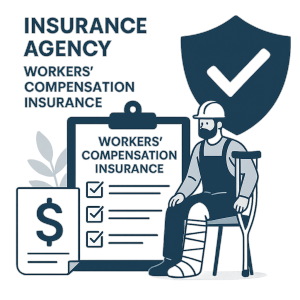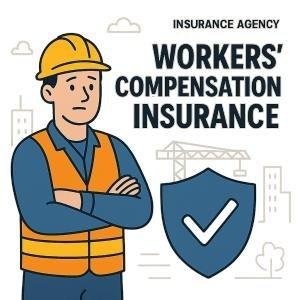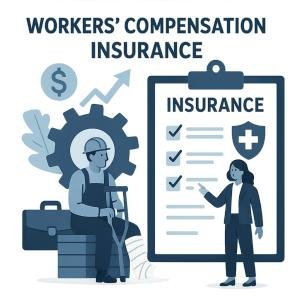
Concert & Festival Security Guards: Workers’ Comp Coverage During Peak Season
July 26, 2025
Workers’ Comp for Hospice Nurses vs. Home Health Aides: Key Coverage Differences
July 26, 2025In the dynamic landscape of employee safety and risk management, vehicle patrol assignments present unique challenges for employers across Georgia. As organizations increasingly rely on mobile workforce operations, understanding and mitigating the complexities of auto-related workers’ compensation claims is critical. This article explores the specific exposures associated with vehicle patrol duties, offering strategic insights into effective risk management practices that can help businesses protect their workforce, control costs, and ensure regulatory compliance within the state of Georgia.
Table of Contents
- Vehicle Patrol Risks and Common Injury Types in Georgia
- Understanding Georgia’s Workers’ Compensation Regulations for Auto-Related roles
- Best Practices for Risk Mitigation and Safety Training in Vehicle Patrol
- Claims Management Strategies and return-to-Work Programs for Injured Patrol Employees
- Q&A
- Concluding Remarks
Vehicle Patrol Risks and Common Injury Types in Georgia
Patrolling vehicles in Georgia expose workers to a variety of risks that can lead to serious injuries and workers’ compensation claims. Common hazards include adverse weather conditions, road hazards, and high-speed travel, which increase the likelihood of collisions. Additionally, patrolling officers face safety challenges from distracted driving by others, poor lighting, and unfamiliar routes. These factors contribute to a spectrum of injuries, ranging from minor strains and sprains to severe traumatic injuries such as fractures and spinal cord damage.
Understanding the typical injury types can help employers implement targeted safety protocols. In Georgia,the most frequently reported injuries in vehicle patrol work involve:
- Whiplash and neck strains due to sudden impact or abrupt stops.
- Lower back injuries caused by prolonged sitting combined with sudden jolts.
- Concussions and head trauma from collisions or vehicle rollovers.
- Fractures commonly affecting limbs during accidents or falls when exiting the vehicle.
Understanding Georgia’s Workers’ Compensation Regulations for Auto-Related Roles
In Georgia, workers’ compensation for auto-related roles is governed by specific regulations designed to address the unique risks encountered by employees in vehicle patrol and transportation duties. Employers must ensure compliance with state laws that mandate coverage for injuries sustained during work-related driving, vehicle maintenance, and roadside assistance tasks. Understanding these regulations is critical, as Georgia’s workers’ comp system aims to balance adequate employee protection with cost-effective risk management for businesses. Key factors include the classification of employees, the scope of covered incidents, and the procedure for filing claims promptly to avoid delays or disputes.
To effectively manage these exposures, businesses should focus on several core components:
- Accurate employee job classification: Distinguishing between driving-intensive roles and occasional vehicle use.
- Comprehensive safety training and protocols: Reducing accident frequency and severity by implementing defensive driving courses and regular vehicle inspections.
- Clear claims management process: Establishing a streamlined system for reporting injuries and handling medical evaluations.
- Regular policy audits: Ensuring workers’ comp insurance reflects the current workforce composition and operational risks.
| Risk Factor | Mitigation Strategy | Impact on Workers’ comp |
|---|---|---|
| Frequent vehicle operation | Defensive driving training | Reduced claim frequency |
| Poor vehicle maintenance | Routine inspections | Lower injury severity |
| Unclear job roles | Accurate classification | Proper premium assessment |
Best Practices for Risk Mitigation and Safety Training in Vehicle Patrol
Employers should establish a clear framework for risk mitigation that includes:
- Pre-shift vehicle inspections to identify potential mechanical issues before patrols commence
- strict adherence to Georgia’s road safety regulations tailored to patrol-specific conditions
- Dynamic route planning to avoid high-risk areas and reduce time spent in hazardous environments
- Comprehensive incident reporting protocols to ensure timely response and corrective action
| Training Component | Key Benefits |
|---|---|
| Defensive Driving | Reduced collision risk, improved hazard anticipation |
| Vehicle Maintenance Checks | Prevention of mechanical failures during patrol |
| Incident Reporting | Faster investigation, mitigation of liability exposure |
Claims Management Strategies and Return-to-Work Programs for Injured patrol Employees
Effective management of workers’ compensation claims for injured patrol employees begins with a comprehensive approach that emphasizes prompt reporting and thorough documentation of incidents. Immediate dialog with claims adjusters and maintaining clear records of medical evaluations can significantly reduce processing delays and prevent claim disputes. Incorporating a centralized tracking system tailored to patrol operations enhances visibility over case progress and supports proactive decision-making throughout the claims lifecycle.
return-to-work programs are equally essential in promoting recovery while minimizing operational disruptions. Focused on facilitating a safe and gradual reintegration into duty,these programs typically include:
- Modified or light-duty assignments aligned with medical recommendations
- regular rehabilitation monitoring and physical therapy coordination
- Employee support services addressing mental and physical health
Optimizing these strategies not only expedites employee recoveries but also helps control claim costs and reinforces workforce resilience.
Q&A
Q&A: Managing Auto-Related Workers’ Compensation Exposures for Vehicle Patrols in Georgia
Q1: What types of risks are associated with vehicle patrol work in georgia?
A1: Vehicle patrol employees in Georgia face numerous risks, including motor vehicle accidents, slips and falls while entering or exiting vehicles, assaults or confrontations during patrols, and ergonomic hazards related to prolonged driving.These factors contribute to a higher likelihood of workers’ compensation claims linked to auto-related incidents.
Q2: How does Georgia’s workers’ compensation system address auto-related injuries for patrol employees?
A2: Georgia requires employers to provide workers’ compensation insurance that covers work-related injuries, including those sustained during vehicle patrol duties. Auto-related injuries are compensable if they occur within the scope of employment. Claims typically encompass medical treatment, wage replacement, and rehabilitation costs, subject to state-specific eligibility criteria.
Q3: What are best practices for managing workers’ comp exposures in vehicle patrol operations?
A3: Effective management includes comprehensive driver training programs,regular vehicle maintenance and safety inspections,implementation of detailed incident reporting protocols,and ergonomic assessments to minimize strain. Additionally, employing technology such as GPS tracking and collision alert systems can reduce accident risks and support incident investigations.
Q4: How can employers reduce the frequency and severity of auto-related workers’ comp claims?
A4: Employers can reduce claims by enforcing strict vehicle safety policies, promoting defensive driving techniques, scheduling regular breaks to prevent fatigue, and conducting thorough background checks on drivers. Furthermore, proactive risk assessments and safety culture initiatives foster employee awareness and accountability.
Q5: What role does documentation play in managing vehicle patrol workers’ comp claims?
A5: Accurate and timely documentation is critical for validating claims and managing costs. Employers should maintain detailed records of driver training, maintenance logs, incident reports, and communication with injured employees. Proper documentation aids in claim evaluation, dispute resolution, and regulatory compliance.
Q6: Are there specific legal considerations in Georgia for handling auto-related workers’ compensation claims?
A6: Yes. Georgia follows a no-fault workers’ compensation system, but employers must be aware of statutory deadlines for reporting injuries and filing claims. Additionally, there may be complexities when distinguishing between personal vehicle use and company vehicle incidents, requiring clear policies and legal guidance to ensure proper claim handling.
Q7: How can insurance providers support employers with vehicle patrol-related exposures?
A7: Insurers can offer risk management consultation, customized safety programs, loss control services, and claims management support tailored to vehicle patrol operations. Collaborative efforts between employers and insurers help identify exposure trends and implement effective mitigation strategies.
Q8: What emerging trends should companies consider when managing vehicle patrol workers’ comp risks in Georgia?
A8: emerging trends include leveraging telematics and AI-driven analytics to monitor driving behaviors, integrating wearable safety technology, and adopting flexible work schedules to reduce fatigue. Additionally, evolving regulatory standards and increasing cyber-physical security concerns regarding connected vehicles are becoming relevant considerations.
Concluding Remarks
managing workers’ compensation exposures related to vehicle patrol duties in Georgia demands a proactive and comprehensive approach. By understanding the unique risks inherent to auto-related patrol work and implementing targeted safety protocols, organizations can not only safeguard their employees but also mitigate financial and operational impacts. Staying informed of state-specific regulations and fostering a culture of safety are essential steps in minimizing claims and ensuring compliance. Ultimately, a strategic focus on risk management and employee well-being will strengthen your institution’s resilience and support long-term success in vehicle patrol operations.
“This content was generated with the assistance of artificial intelligence. While we strive for accuracy, AI-generated content may not always reflect the most current information or professional advice. Users are encouraged to independently verify critical information and, where appropriate, consult with qualified professionals, lawyers, state statutes and regulations & NCCI rules & manuals before making decisions based on this content.







